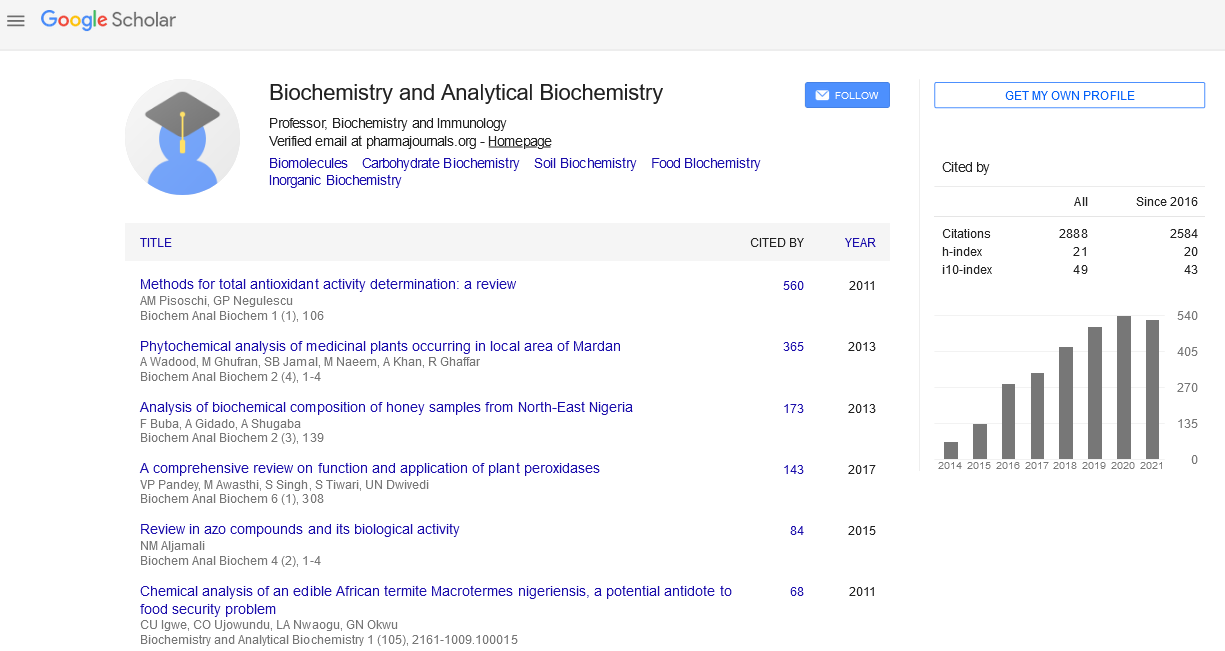Indexed In
- Open J Gate
- Genamics JournalSeek
- ResearchBible
- RefSeek
- Directory of Research Journal Indexing (DRJI)
- Hamdard University
- EBSCO A-Z
- OCLC- WorldCat
- Scholarsteer
- Publons
- MIAR
- Euro Pub
- Google Scholar
Useful Links
Share This Page
Journal Flyer

Open Access Journals
- Agri and Aquaculture
- Biochemistry
- Bioinformatics & Systems Biology
- Business & Management
- Chemistry
- Clinical Sciences
- Engineering
- Food & Nutrition
- General Science
- Genetics & Molecular Biology
- Immunology & Microbiology
- Medical Sciences
- Neuroscience & Psychology
- Nursing & Health Care
- Pharmaceutical Sciences
Pharmaceutical potential of inhibition of mitochondrial fat oxidation in skeletal muscle to treat obesity and diabetes
International Conference on Biochemistry, Proteomics & Bioinformatics
May 16-17, 2018 Singapore
Bolormaa Vandanmagsar, Jaycob D Warfel, Robert C Noland and Randall L Mynatt
Louisiana State University, USA
Scientific Tracks Abstracts: Biochem Anal Biochem
Abstract:
Fatty acids are the primary fuel source for skeletal muscle function. On the other hand, impaired fatty acid oxidation is associated with insulin resistance. To investigate the role of mitochondrial fatty acid oxidation in the development of obesity and obesity-related insulin resistance, we created a mouse model by deleting Carnitine palmitoyltransferase-1b specifically in skeletal muscle (Cpt1bm-/-). CPT1B is enzyme that transports long-chain fatty acid into mitochondria, thus it is essential for β-oxidation in muscle. Since Cpt1b-deletion impaired fatty acid oxidation, we expected Cpt1bm-/- mice to be obese and diabetic. Surprisingly, Cpt1bm-/- mice manifest increased glucose utilization and are resistant to diet-induced obesity. We found that inhibition of mitochondrial fatty acid oxidation induces FGF21 expression specifically in skeletal muscle and FGF21 increases glucose uptake in muscle in a paracrine manner. Furthermore, secretion of FGF21 from muscle increases circulating FGF21 level, thus acts systemically remodeling metabolism in white adipose tissue. However, FGF21 appears partially responsible for the phenotype of resistant to obesity in Cpt1bm-/- mice. Also, we found that AMPK and Akt1 signaling pathways are involved in the induction of FGF21 in Cpt1b-deficient skeletal muscle. Altogether, our findings suggest that pharmacologically targeted CPT1b inhibition specifically in skeletal muscle could trigger favorable adaptive responses, resulting in improved glucose uptake and reduced fat mass.
Biography :
Bolormaa Vandanmagsar has graduated from Russian State Medical University in Moscow, Russia and has received her PhD at the School of Medicine, People’s Friendship University of Russia, Moscow, Russia. She has further completed her Postdoctoral training at the School of Medicine, Yonsei University, Seoul, South Korea and National Institute on Aging, NIH, Baltimore, Maryland, USA. Currently, she is an Assistant Professor at the Gene-Nutrient Interaction Laboratory, Pennington Biomedical Research Center, Louisiana State University System, Louisiana, USA. Her research focuses on obesity, obesity-associated metabolic diseases such as type-2 diabetes, obesity-induced insulin resistance and obesity-associated inflammation.
Email:vandanb@pbrc.edu


